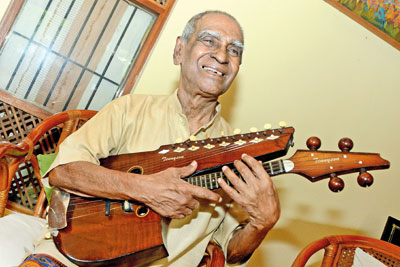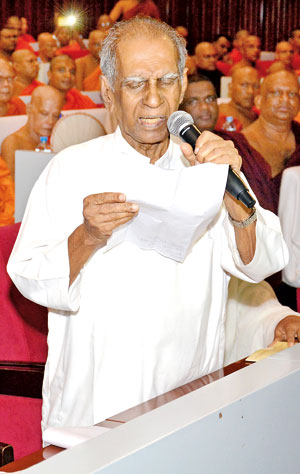To a Maestro with love

Pandit Amaradeva strumming his unique mando-harp: Sri Lanka said farewell to one of her most beloved composers and singers yesterday. Pic by M.D. Nissanka
The Musical Genius is no more. Yet his contribution to indigenous music will be remembered for generations to come. Regarded as a national treasure, Pandit Amaradeva has been our foremost musician – singer, violinist, music composer and director. Forging his own style, his contribution to the development of modern Sinhala music has been enormous.
When he started out, the lad from Moratuwa, Albert Perera as he was then known, was a violinist. In 1948 he was picked by Mohammed Ghouse, music director of the second Sinhala film âAsokamalaâ, to play the violin in his orchestra. Ghouse Master wanted him to sing in the film coupled with a bit of acting. âAyikereyamekaaleâ and âBhavebhitaheraâ still remain classics.
Thatâs how his musical journey began â a journey that would take the unassuming young man to the pinnacle of success and a place in the hearts of all Sri Lankans as the countryâs most beloved composer and singer.
We enjoyed his songs in our schooldays at Ananda. We continued to sing his âShantha me re yameâ and âPeenamuko kalugangeâ during our university trips. He enthralled us at Peradeniya in the early days of the campus in the 1950s at âMelaâ concerts. It was around that time that thanks to the initiative taken by the Lankadipa editor D.B. Dhanapala and Professor Ediriweera Sarachchandra, he got the opportunity to go to Bhatkande University in Lucknow to study music. His tutors included Pandit Vishnu Govind Jog who was most impressed with his violin playing. He excelled in his art and by the time he returned after a five-year stint at Bhatkande, he had collected a âdouble degreeâ â Sangeeth Visharad (vocal) and Vadya Visharadh (instrumental – violin).
Returning as Amaradeva, he was handed a challenging assignment – composing music for Chitrasenaâs epoch-making ballet, Karadiya. The music he composed was greatly appreciated by rasikas both in Sri Lanka and abroad. Amaradeva had forged a new path in Sinhala ballet music. The theme song âHoiya,hoiyaâ by Mahagama Sekera became an instant hit. In the Chitrasena ballet Nala Damayanthi, Sekera and Amaradeva created the classic – âAetha kandukara himawaraneâ.
Amaradeva used the State radio to good effect, creating innovative musical programmes. âJana Gayanaâ, that he pioneered with Madawela S. Ratnayake, was
an experiment in presenting the traditional folk music in a new garb – it marked the beginning of a creative effort in developing an indigenous music based on folk melodies. Then came âMadhuvantâ Â with Mahagama Sekera where a combination of ragadhari music with folk traditions was used to create some of the most beautiful melodies. Thatâs how songs created in the early 60s – âSannaliyaneâ, âIrata muwavenâ, âMala hiru basina sendeyaameâ among many others – occupy a special place in our music scene. Vijaya Geetha written by Dalton Alwis produced some of the most memorable patriotic songs like âSasara wasana thuruâ- which became the theme for his musical programmes in recent years.
Another noteworthy combination was Amaradeva and Sri Chandraratne Manawasinghe. âJaganmohiniâ, created for the Sarasaviya Film Festival in 1964 has come to stay as a unique invocation to Sarasawathie. When Amaradeva sings Manawasingheâs words in âMahabovannamaâ, we could feel the rustling of the leaves of the Bo tree.

Making what was perhaps his last public appearance at the BMICH on October 30. Pic by Isanka Sunimal
When I first met him in 1967 for a chat for âThe Artsâ column I did for Sunday Observer, I found him to be a firm believer that Sinhala music should be developed through creative work. Music should be developed on a universal theme rather than a narrow national outlook, he felt.
He was then doing a new musical programme, âRasamiyuruâ broadcast over Radio Ceylon gathering inspiration from tradition and heritage, and trying to give a new look to several types of folk music. He presented songs based on vannam. A song based on nelumkavi was an experiment of listener participation – a chat between a village boy and his girl with those around joining in. Amaradeva called it âa new phase in duetsâ, and combined the dramatic element in the nadagama. There was another song â a trek to Sri Pada â developed on devotional folk songs. Yet another portrayed how a villager spent the day. The tempo in each was varied to fit the mood.
The 1960s saw Pandit Amaradeva making his mark as a music director and playback singer in Sinhala films. In just five years, he won four Sarasaviya Film awards âBest Music Director (Gamperaliyaâ â 1964) and three as the Best Playback Singer (âGetawarayoâ â 1965; âSenasuma Kothaadaâ â 1967; âSath Samuduraâ â 1968). He was then the only artiste to win so many awards at the only film festival.
The music he created for Sinhala films stands out way ahead of others, as evidenced by the scores in Gamperaliya, Ranmutuduwa, Ransalu, Getawaraya, Delovaka Atara, Akkara Paha, Sadol Kandulu, Tung Mang Handiya,âParasathu Mal, Saravita and Madol Duwa. Equally memorable was his rendering of film songs. âPipunukusumaâ and âSinindu sudumututalaweâ (Sath Samudura) written by Dr. Siri Gunasinghe set to the music of Somadasa Elvitigala or âSansaragamaneâ (Senasuma Kothanada â Premasiri Khemadasaâs music) are just a few that come to mind.
In recent years I kept the English readership informed of his musical pursuits in the âKala Kornerâ column in the Sunday Times. A collection of these articles was published and presented to him on his 86th birthday. Titled âThe Musical Geniusâ it is the only book on him in English although there have been many in Sinhala.
I met him last in Sydney in August 2015 â he was spending four to five days resting after a concert in the major cities. Moving around was quite strenuous.
Among the most recent songs he sang , âAadarayada Meâ – the theme song in the teledrama, âAgniâ and âHantana Sihineâ he sang with Umaria for the documentary âThe Garden Universityâ, the latter bringing back sweet memories of my own Peradeniya days, were my particular favourites.
Many are the titles, accolades and honours bestowed on him. But he remained the simple, unassuming individual he always was.
In 2001, Pandit Amaradeva joined the select band of Ramon Magsaysay Award winners being chosen for this prestigious award â Asiaâs Nobel Prize â for his significant contribution to literature and creative communications for over five decades.
âI consider it an honour conferred on the entire community of Sri Lankan artistesâ is how Amaradeva reacted to the news.
He was the first Sri Lankan to be honoured by the Bhatkande Institute of Music with the title âPanditâ in 1991 in recognition of his outstanding contribution towards the development of Sri Lankan creative music.
The University of Kelaniya conferred on him the degree of Doctor of Philosophy (Ph.D) – Fine Arts âHonoris Causaâ in 1991 and the University of Ruhuna, the degree of Doctor of Literature (D.Litt) in 1993 as did the University of Peradeniya in 1999. In 2014, the Ministry of National Languages & Social Integration conferred on him the title âJatika Samagiye Maha Sammanayaâ recognising his contribution towards the promotion of national unity.
I wind up being reminded of one of the most moving songs he sang -âMa mala pasu sohonkote âDukgeeyak liyanumenaviâ.The lyric writer Mahagama Sekera, music director Somadasa Elvitigala and now singer Amaradeva are all no more.
Maestro – âMay your path in âSamsaraâ be smooth and fruitful until you achieve the ultimate goal, Nirvana!â
| In their words As millions mourn the death of Pandit W.D. Amaradeva and pay tribute to him, the melody and words that will forever be etched into the very minds, hearts and souls of Sri Lankans will be those of âSasara Wasana Thuru, Nivan Dakina Thuruâ. Creating the poignant melody for âSasara Wasana Thuruâ and lending his voice to the lyrics of Dalton Alwis, this Maestro immortalized this song, weaving the strong thread of patriotism and love for Sri Lanka, into the fractured tapestry of a country assailed by prejudice and bias. âSasara Wasana Thuru, Nivan Dakina Thuru,  Pinketha Hela Ran Derane  Yali Upadinnata  Hethu Wasana Wewa, Hethu WasanaâŠâŠ..â âŠâŠâŠ.and the fervent and dearest wish of all Sri Lankans with tears in their eyes and sorrow in their hearts, will be that as yearned for in this song, Amaradeva will be reborn in this beautiful land of ours. Here some leading personalities in the music scene share their thoughts on the Maestro:  Â
âAmaradeva is one of the pioneers of the Sri Lankan music industry. The Maestro is an example for the youngsters musically because his creations are unique and brought in a lot to the music industry of Sri Lanka. A music great like Amaradeva is blessed to this earth very rarely, his demise is a great loss to everyone. He will not be replaced or forgotten.â -Prof. Sunil Ariyarathna âAmaradeva Uncleâs demise is a great loss for Sri Lanka. He worked with my father, Premasiri Khemadasa, on many collaborations like âSanda Horen Horenâ and âMeh Gee Edha Age.â People like Maestro Amaradevaâs and fatherâs contribution to Sri Lankan music have been unique. â - Gayathri Khemadasa In the 1980s – I had completed my A/Ls and had joined the SLBC orchestra as I waited to get into university. There was an audition for young musicians to compose songs. I had made my first song â a Saraswati Abhinandana – and had asked Pandit Amaradeva to sing for this. He was a giant in the field â there were many who said he will not turn up. On the day of the live recording, the SLBC orchestra and I waited. He walked in. The song was recorded. That for me defines the kind of man he was. One thing that is often forgotten in Sri Lanka is that he was a superb Indian classical musician. Once, when there was a special public performance given to me at SLBC, he came and played a classical duet with me â he on the violin and me on the sitar. The same for the one hour Rupavahini programme I did during the time of Sunil Sarath Perera. When I toured the world with him as a part of his orchestra at the beginning of my career, he paid me great honour by allowing me to play classical duets with him all over the world. This is a mark not only of a truly great musician but a truly great human being. About his classical music – he could bring a dead instrument to life. That is true of his classical music performances as well as his contribution to light music. He did amazing things for the Sinhala song too. He was lucky because at the time he approached this field there were superb lyricists like Mahagama Sekera to give him songs. His songs have a great harmony between words and music. These songs are true gifts. -Pradeep Ratnayake Amaradeva Sir lived his life fully and respectably.He has left a lot behind for those in his generation and all the generations that follow after him. He is an example to all, I say this as one of his students in university. He may have left this earth but he will live among us through his music and forever live in our hearts. -Edward Jayakody
|


